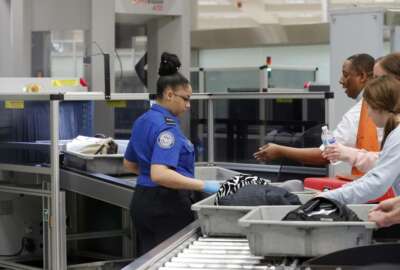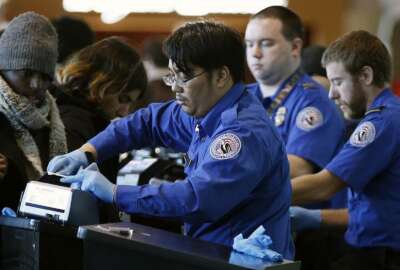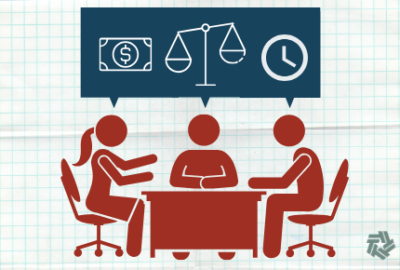
Debate over TSA pay shows why civil service reform is probably a longshot
Transportation security officers are among the lowest paid federal employees in government. The debate over how to raise their pay shows just how difficult reform...
Occasionally an administration or a think-tank may bring up the “civil service reform” phrase. Does it faze you?
You probably think about you pay, your retirement and anything that might impact those two.
We here at Federal News Network usually cover those statements about civil service reform, only to see them go… nowhere, really.
The debate is back, sort of. It’s seemingly limited to just one agency at the moment, though one the public knows well.
The Transportation Security Administration is approaching its 20th anniversary, and yet starting salaries for some transportation security officers are as low as $29,000 a year.
No surprise, TSA has trouble keeping many of their officers. One American Federation of Government Employees local president told the press last week that of his 650-to-700 TSOs in Philadelphia, nearly 200 leave each year.
It doesn’t help that the hours are bad, the work is long and tedious and after 20 years of going through security checkpoints, there’s always someone in line who wants to bring their 18-ounce water bottle through.
Former Homeland Security secretary Jeh Johnson has said he learned this through experience, when he dressed in a TSO uniform and worked an airport security checkpoint. He only had to work the checkpoint line for an afternoon.
Oh yeah, and there’s a pandemic. Sure, travel volumes were down last year, but TSOs still had to touch your stuff and remind you to wear your mask. The agency tracked 2,000 instances of non-compliance with the mask mandate, TSA officials told Congress last week.
The good news is there’s a good amount of bipartisan agreement that TSOs are underpaid, just no consensus over how to raise their salaries.
One option is simply giving TSA more money to pay their TSOs more. The agency already has the authority to do it, but hasn’t, at least not until recently. Some believe Congress could be more prescriptive in how TSA uses this authority and set a more concrete framework for raising salaries.
Another is moving TSOs into the same personnel system that many (but certainly not all) feds are in today. That’s Title 5, which includes pay under the General Schedule, full collective bargaining rights, and the right to bring disciplinary appeals to the Merit Systems Protection Board.
The chairmen of several key House committees have introduced legislation that would do all of those things.
Democrats say this approach would bring equity to TSOs, who have tough and often dangerous jobs. The General Schedule, they argue, is predictable.
Others, however, say the flaws with the old General Schedule are just too glaring to ignore. They say the old system — designed back in 1949 when secretaries had the most popular job in the federal government — isn’t conducive to a modern world where passengers have to take their shoes off to fly.
Perhaps more importantly, they also say the General Schedule may not guarantee significantly higher pay for TSOs.
Overhauling the General Schedule — or even how feds are paid in general — is hard. Like, really hard and potentially time-consuming. I say potentially, because it hasn’t happened in 72 years.
Congress would have to get involved, and members aren’t really interested. Federal employee unions aren’t either. They say the General Schedule brings uniformity and a degree of fairness to an environment where predictability is often in short supply.
Proponents of the General Schedule approach for TSA say the fact that the old system hasn’t changed in 72 years is reason alone to bring it to the TSOs. TSA largely hasn’t used its own authorities to pay TSOs more either.
The debate over TSA pay shows that, considering the options for giving TSOs a raise are 1) move them to the old system with acknowledged flaws or, 2) maintain what looks like the status quo.
So what’s next?
House Democrats have passed a similar version of their bill, the Rights for the TSA Workforce Act, twice before. It will likely pass the House again, where its fate is less certain in a divided Senate.
The bill very well could come to the Senate floor this time for a vote. But its fate may depend on how much research senators choose to do on the federal employee pay system.
Nearly Useless Factoid
By Alazar Moges
The oldest man to sign the Declaration of Independence was Benjamin Franklin, at age 70. The youngest was South Carolina lawyer Edward Rutledge, at age 26.
Source: National Archives
Copyright © 2025 Federal News Network. All rights reserved. This website is not intended for users located within the European Economic Area.
Nicole Ogrysko is a reporter for Federal News Network focusing on the federal workforce and federal pay and benefits.
Follow @nogryskoWFED





